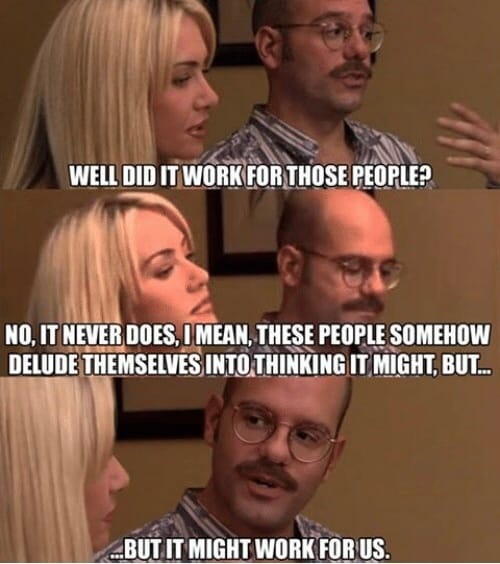You’re not that great. Don’t take it the wrong way, I’m not that great either, but there’s a subtle point here. Overconfidence is a problem we – and the people we seek to serve – all suffer from. The good news is that just knowing it exists can help us deal with it.
Organizational Psychologist Daniel Crosby explains overconfidence as a meta-problem that seeps into all sorts of areas of life. We’re constantly thinking of how we’re the exception to various rules when we’re usually (on average) not.
The unholy trinity of overconfidence includes thinking:
we’re smarter
we’re luckier, and
we’re better at predicting the future than others.
Amen.
Now, that’s great, but like we just said: on average we’re not. We’re not smarter, we’re not luckier, and we’re no better at predicting the future than even the averagest of bears.
Get away from the mirror and look around for a minute. Think about how overconfident institutions end up sounding like Lake Wobegon, “Where all the women are strong, all the men are good looking, and all the children are above average.” Think about how overconfident partnerships end up sounding like Dr. Tobias Fünke in Arrested Development:

Well did it work for those people?No, it never does. I mean, these people somehow delude themselves into thinking it might but… but it might work for us.
It seems silly. It seems like we can easily laugh at it and claim, “haha… oh, that’s not US.” But, back to the mirror – we’re not that great. And it’s not all bad either. From another perspective, overconfidence can be an amazing set of horse-blinders, because without it – lots of stuff would never get done.
Consider that 20% of small businesses fail in their first year. That number shoots up to 30% by the end of the second year, 50% by the end of the fifth year, and 70% by the end of the tenth year. That’s according to accounting software company FreshBooks.
And yet, 80% of small businesses don’t fail in year one, 70% get through their second, half are still alive in five, and 30% persevere beyond a decade. What do all of these survivors and failures have in common? Overconfidence.
So what do we do about it? All hope is not lost (just some of it). To battle overconfidence we have to remember that we’re not nearly as great as we think we are. We’re not the smartest, the luckiest, or the soothsayeriest in most categories on average. But…
Once in a while, we might be. Those are the opportunities we need to chase. These are the times to be conscientiously overconfident. If it adds to our identity and purpose, even if we might be wrong, we should jump in.
What matters is that we remain self-aware enough to accept it might not work out, and self-confident enough to know we’ll be alright no matter which side we come out on.
It’s a logic that we can apply personally and professionally. When we, the people we work with, and the people we work for are conscientiously overconfident, we take the right risks for the right reasons and help move the world in the right direction: forward.
I primarily took this idea from Daniel Crosby’s interview on the Elementality podcast, but I also took the title from his TED talk, “You’re Not That Great: A Motivational Speech.” And, if you like him, check out his books/podcasts/etc over at Standard Deviations Pod.
